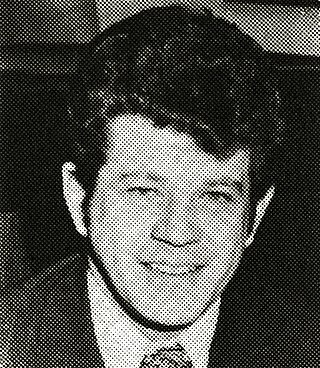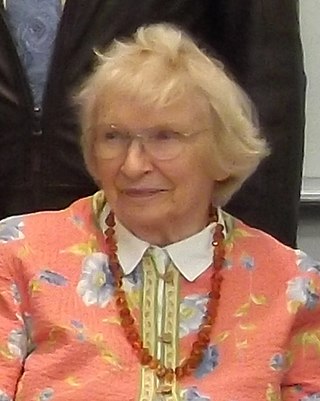
Frank Hughes Murkowski is an American politician. A member of the Republican Party, he served as a United States Senator representing Alaska from 1981 to 2002 and as the eighth governor of Alaska from 2002 to 2006.

Anthony Carroll Knowles is an American politician and businessman who served as the seventh governor of Alaska from 1994 to 2002. Barred from seeking a third consecutive term as governor in 2002, he ran unsuccessfully for the U.S. Senate in 2004 and again for governor in 2006. In September 2008, Knowles became president of the National Energy Policy Institute, a non-profit energy policy organization funded by billionaire George Kaiser's family foundation, and located at the University of Tulsa.
A write-in candidate is a candidate whose name does not appear on the ballot but seeks election by asking voters to cast a vote for the candidate by physically writing in the person's name on the ballot. Depending on electoral law it may be possible to win an election by winning a sufficient number of such write-in votes, which count equally as if the person were formally listed on the ballot.

The 2006 Alaska gubernatorial general election took place on November 7, 2006. The former mayor of Wasilla, Sarah Palin, defeated incumbent governor Frank Murkowski in the Republican primary, and then went on to defeat former governor Tony Knowles in the general election. Palin became the first governor of the state to be born after Alaskan statehood.

Leland Chancy Croft was a workers' compensation attorney and Democratic Party politician from the U.S. state of Alaska. Elected to the Alaska House of Representatives in 1968, he served a single term from 1969 to 1971. He was then elected to the Alaska Senate, serving in that body from 1971 to 1979, including serving as the president of the Senate from 1975 to 1977 during the 9th Alaska State Legislature.

John Howard Lindauer II is an American economist who served as chancellor for the University of Alaska Anchorage from 1976 to 1978 then was Dean of the School of Business and Public Affairs. He was the Republican Party candidate for governor of Alaska in 1998, but ultimately ended up pleading no contest to campaign finance violations. He is the father of Susan Lindauer and John Howard Lindauer III, and lived in Alaska from 1976 until 2002. He currently resides in Chicago.

The 1998 Alaska gubernatorial general election took place on November 3, 1998. The election resulted in a landslide for the Democratic incumbent, Tony Knowles, who had won the 1994 gubernatorial election by only 536 votes. Jim Sykes, founder of the Green Party of Alaska, ran on that party's ticket, but Desa Jacobsson later replaced him on the ballot.

Although in its early years of statehood, Alaska was a Democratic state, since the early 1970s it has been characterized as Republican-leaning. Local political communities have often worked on issues related to land use development, fishing, tourism, and individual rights. Alaska Natives, while organized in and around their communities, have been active within the Native corporations. These have been given ownership over large tracts of land, which require stewardship. The state has an independence movement favoring a vote on secession from the United States, with the Alaskan Independence Party, but its membership has shrunk in recent decades.

The 2002 Alaska gubernatorial election took place on November 5, 2002, for the post of Governor of Alaska. Republican U.S. Senator Frank Murkowski defeated Democratic Lieutenant Governor Fran Ulmer. Murkowski became the first Republican elected governor of Alaska since Jay Hammond in 1978.

The 1994 Alaska gubernatorial election took place on November 8, 1994, for the post of Governor of Alaska, United States. Democratic candidate Tony Knowles narrowly defeated Republican candidate Jim Campbell and Lieutenant Governor Jack Coghill of the Alaskan Independence Party. In the Republican Revolution year of the 1994 elections, Alaska's was the only governor's seat in the country to switch from Republican to Democratic.

The 2004 United States Senate election in Alaska took place on November 2, 2004, alongside other elections to the United States Senate in other states as well as elections to the United States House of Representatives, various state and local elections, and the presidential election of that year. Incumbent Republican U.S. Senator Lisa Murkowski of Anchorage, sought election to her first full term after being appointed by her father Frank Murkowski to serve out the rest of the latter's unexpired term when he resigned in December 2002 to become Governor of Alaska. Her main challenger was Democratic former governor Tony Knowles, her father's predecessor as governor. Murkowski won by a slight margin. As of 2022, Lisa Murkowski’s vote total of 149,773 votes remains the most raw votes she has ever received during any of her runs for the US Senate.

The 2010 United States Senate election in Alaska took place on November 2, 2010, to elect a member of the United States Senate to represent the State of Alaska, alongside 33 U.S. Senate elections in other states, elections in all states for the U.S. House of Representatives, as well as various state and local elections. The general election was preceded by primary elections which were held on August 24, 2010. Scott McAdams, the Mayor of Sitka, became the Democratic nominee; Joe Miller, an attorney and former federal magistrate, became the Republican nominee after defeating incumbent U.S. Senator Lisa Murkowski. Miller was endorsed by the Tea Party movement and former Governor Sarah Palin. Murkowski announced that despite her defeat in the primary, she would run in the general election as a write-in candidate.

The 2010 Alaska gubernatorial election took place on November 2, 2010. Former Governor Sarah Palin did not run, having resigned in July 2009. Incumbent Governor Sean Parnell, who as lieutenant governor succeeded Palin following her resignation, announced that he would seek a full term.

The 1990 Alaska gubernatorial election took place on November 6, 1990, for the open seat of Governor of Alaska. In 1989, incumbent Governor Steve Cowper, a Democrat, had announced that he would not seek re-election for a second term.

Jane Arliss Sturgulewski was an American businesswoman and Republican politician from the U.S. state of Alaska. In a political career in which she started appearing in the spotlight in 1975, she represented Anchorage in the Alaska Senate from 1979 to 1993. Twice during off-years in re-election to her four-year Senate term, she won the Republican nomination for governor of Alaska against mostly conservative opposition in blanket primaries. The second time, in 1990, she came out in third place behind Walter Hickel and runner up Tony Knowles, which was the second of three times in Alaska's history a major-party nominee placed third. She won a 2000 Anchorage Athena award.

The 1964 United States presidential election in Alaska took place on November 3, 1964, as part of the nationwide presidential election. Voters chose three representatives, or electors to the Electoral College, who voted for president and vice president.
Jerry Ward is an American politician and businessman.

The 2018 Alaska gubernatorial election took place on November 6, 2018, to elect the governor and lieutenant governor of Alaska. In the primaries for recognized political parties, candidates for governor and lieutenant governor run separately. The winners of each respective primary for governor and lieutenant governor then become a joint ticket in the general election for their political party. Incumbent Independent governor Bill Walker was seeking re-election in what was originally a three-way race between Walker, Republican former Alaska state senator Mike Dunleavy, and Democratic former Alaska U.S. Senator Mark Begich. Despite Walker dropping out on October 19, 2018, and endorsing Begich, Dunleavy won in what was the only gubernatorial gain by a Republican candidate in 2018. As of 2024, this was the last time the Governor's office in Alaska changed partisan control. Walker later unsuccessfully ran for Governor of Alaska in 2022.
Alaska's 1st House of Representatives district is the first of 40 districts of the Alaska House of Representatives and was created in statehood in 1959. It is currently represented by Republican Bart LeBon. Following redistricting in 2013, the district is currently composed of downtown Fairbanks and has a population of 17,182.

The 2022 Alaska gubernatorial election was held on Tuesday November 8, 2022, to elect the governor of Alaska. Incumbent Republican Governor Mike Dunleavy won re-election to a second term, becoming the first Republican governor to be re-elected to a second term since Jay Hammond in 1978 and the first governor, regardless of political affiliation, to be re-elected to a second term since Tony Knowles in 1998.

















